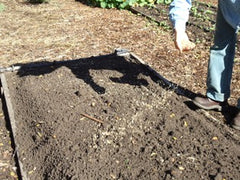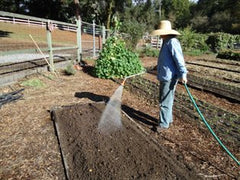
Here in our trial garden in central California, the fall rains have begun. Our climate (UDSA zone 8) is mild and, although we have had hard frost, the ground does not freeze in the winter. Many flowers that had gone to seed from last season have now started to germinate once again.
This is a good indication that it is a great time to sow spring blooming flowers, as the acidity of the rain water helps the seeds to germinate. The plants will grow through the winter and burst into bloom in the spring. It is a great time to sow a canister of Renee’s Scatter Garden seeds.
NOTE: In cold winter climate areas, you can sow seeds in early spring as soon as the soil can be worked.


 3. Make sure to shake out the seed mixture thinly and evenly. Scatter the seeds giving them enough space so that they do not germinate in crowded clumps. This will only stunt the growth of the plants. The rice hulls are easy to see and a good indicator of how far apart the seed has been sown.
3. Make sure to shake out the seed mixture thinly and evenly. Scatter the seeds giving them enough space so that they do not germinate in crowded clumps. This will only stunt the growth of the plants. The rice hulls are easy to see and a good indicator of how far apart the seed has been sown.


 6. Next spring, you will enjoy a lovely carpet of colorful flowers.
6. Next spring, you will enjoy a lovely carpet of colorful flowers.
